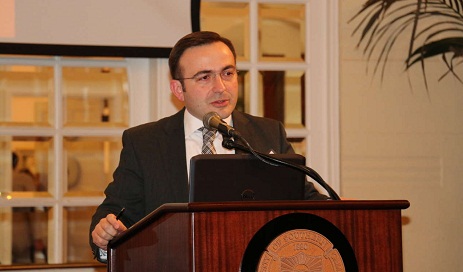Europe suffers from occupation, since it didn`t assess Karabakh conflict properly

“A lack of proper attention to the Khojaly tragedy by the world community is not just unfair to the remaining population of the Khojaly and the citizens of Azerbaijan, it is unfair to the humanity,” he said.
On February 25-26, 1992, the Armenian armed forces, together with the 366th infantry regiment of Soviet troops stationed in Khankendi committed an act of genocide against the population of the Azerbaijani town of Khojaly.
As a result of the massacre, some 613 people were killed, including 63 children, 106 women and 70 old people. Eight families were totally exterminated, 130 children lost one parent and 25 children lost both. A total of 487 civilians became disabled as a result of the onslaught. Some 1,275 innocent residents were taken hostage, while the fate of 150 people remains unknown.
“If the crimes in Khojaly remain unpunished, no one is safe from similar massacres in the future,” he said. “This is one of the tragic events in the contemporary history of Azerbaijan. Unfortunately, this tragedy in Khojaly has not been recognized by the international community, as an international crime. Unfortunately, still people, collectives and states who are bearing personal responsibility on the organization of this events, remain unpunished.”
“When Azerbaijan started movement for independence, the Nagorno-Karabakh conflict was initiated by the leaders of the Soviet Union as a tool to keep the power in the region,” he said. “The Soviet Union used Armenia, as a tool. Armenia and the Nagorno - Karabakh conflict are still the tool to keep the influence."
He said that Azerbaijan community and government did its best to draw attention of international community, organization and scholars to the Khojaly tragedy.
“These attempts should continue, today when occupation has became an issue in Europe,” he said.
The conflict between the two South Caucasus countries began in 1988 when Armenia made territorial claims against Azerbaijan. As a result of the ensuing war, in 1992 Armenian armed forces occupied 20 percent of Azerbaijan, including the Nagorno-Karabakh region and seven surrounding districts.
The two countries signed a ceasefire agreement in 1994. The co-chairs of the OSCE Minsk Group, Russia, France and the U.S. are currently holding peace negotiations. Armenia has not yet implemented the U.N. Security Council`s four resolutions on the liberation of the Nagorno-Karabakh and the surrounding regions.














































